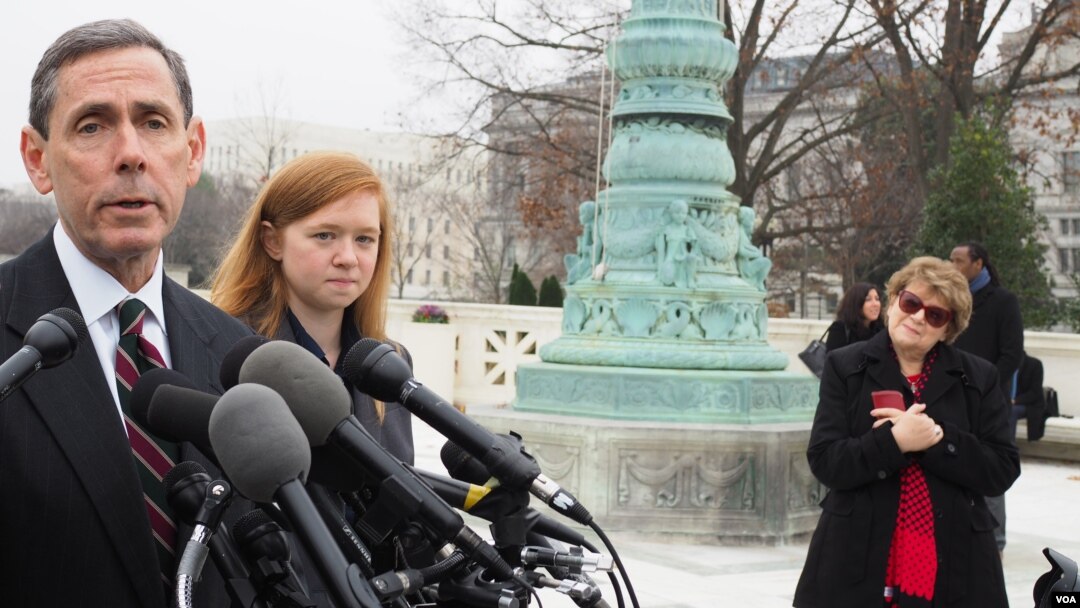The U.S. Supreme Court appeared divided Wednesday after oral arguments were presented in a case that could spell an end to affirmative action programs at schools and colleges nationwide.
The case was brought by a white applicant, Abigail Fisher, who was denied admission to the University of Texas at Austin in 2008. She and her lawyers argue that the university admissions policy violates the U.S. Constitution's 14th amendment, which guarantees equal protection under the law.
Wednesday's 90-minute hearing was the second time the nation's highest court heard the challenge to the 'holistic' admissions system used by the school for a portion of its applicants. In 2013, the court sent the case back to a federal appeals court, which ruled in favor of the university.

Civil rights activist Rev. Al Sharpton addresses supporters of affirmative action outside the U.S. Supreme Court in Washington, D.C., Dec. 9, 2015. ( A. Scott/VOA)
During the arguments Wednesday, conservative Justice Antonin Scalia suggested that African-American students - who along with other minorities benefit from affirmative action - might belong at less rigorous schools.
"I'm just not impressed by the fact the University of Texas may have fewer [blacks]. Maybe it ought to have fewer. I don't think it stands to reason that it's a good thing for the University of Texas to admit as many blacks as possible," Scalia said.
‘Holistic’ admissions
Gregory Garre, who argued in support of the university, responded that minority applicants admitted through the holistic admission program fare better than other students over time.
About 80 percent of first-year students at the University of Texas-Austin are automatically admitted under a program that reserves places for the top 10 percent of Texas high school students regardless of race. The remaining 20 percent are selected through what the school calls a 'holistic' review process that factors in test scores, extracurricular activities, accomplishments, work experience, socioeconomic status, community service, family responsibilities and race.
University of Texas-Austin President Gregory Fenves addresses the media outside the U.S. Supreme Court in Washington, D.C., Dec. 9, 2015. ( A. Scott/VOA)
University of Texas-Austin President Gregory Fenves said after the hearing that "diversity fosters an understanding of one another, of students, and a respect for their differences."
"Colleges and universities across the nation have long been addressing questions surrounding race and ethnicity," he said. "The heightened attention on these issues over the past few months highlights their ongoing importance."
‘Odious classification’
Fisher, who has since graduated from Louisiana State University, said she was denied admission to the University of Texas-Austin in 2008 because she was white. The University of Texas said students admitted through the holistic review program at the time of her application had an academic index of 3.4, while Fisher's was just 3.1.
The school said the majority of those admissions were white, non-Hispanic students, but adds the operation of the holistic review program did increase the percentage of African Americans by 1 percent and that of Hispanic students by 2.5 percent.
Affirmative action supporters rally outside the U.S. Supreme Court in Washington, D.C., Dec. 9, 2015. (A. Scott/VOA)
"Race is an odious classification," said Fisher's lawyer, Bert Rein, who described the university's admission process as "inappropriate." "And it really doesn't matter if your results are small - that sort of indicates that you didn't have to do it in the first place."
In 2003, the Supreme Court ruled that schools can consider an applicant's race as part of their admissions decision, saying they have a duty to provide a diverse student body.
The court's ruling on the Fisher case is expected in June 2016.


